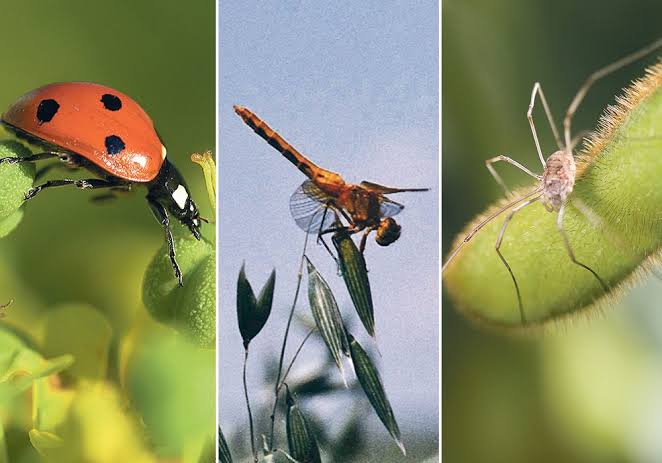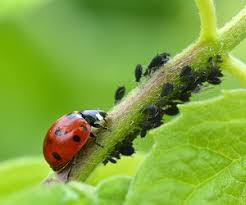Using Beneficial Insects in Agriculture is a smart way to help plants grow better. Farmers and gardeners use these special bugs to protect their crops without harmful chemicals. It’s like having tiny helpers in the field.
When we talk about beneficial insects, we mean bugs that do good things for plants. Ladybugs, for example, love to eat tiny pests that can harm crops. They are like natural bodyguards for plants, keeping them safe from harmful insects. It’s like having tiny superheroes working in the garden.
Another helpful insect is the honeybee. These little workers help plants by pollinating them. Pollination is like plant teamwork – it helps fruits and vegetables grow big and strong. So, having bees around is like having tiny garden helpers who ensure a good harvest.
Farmers and gardeners welcome these good bugs because they reduce the need for chemical pesticides. Chemicals can be harsh and sometimes hurt the environment. Beneficial insects offer a natural and eco-friendly solution. It’s like inviting nature’s own pest control team to keep everything in balance.
Using beneficial insects is also cost-effective. Instead of spending money on chemicals, farmers invest in creating habitats that attract these helpful bugs. It’s like building a cozy home for your insect friends so they can happily live and work in the fields.
Farmers and gardeners learn about which insects are helpful and how to attract them. It’s like creating a bug-friendly environment where everyone has a role to play. By doing this, they ensure a healthy and thriving ecosystem that benefits both the crops and the environment.
In addition, using beneficial insects in agriculture is a wise and sustainable approach. It’s like embracing nature’s helpers to keep crops safe, promote pollination, and maintain a balanced ecosystem. So, the next time you see a ladybug or a busy bee, remember they are not just bugs – they are essential partners in the journey of growing healthy plants.
Read Also: Water Snakes (Nerodia): Species, Habitat, Diet, & More
How to Use Beneficial Insects

Beneficial insects are like little superheroes for your garden. They are tiny helpers that can protect your plants from bad bugs and keep everything in balance. Using these good bugs is easy, and it’s like having a natural pest control team.
Here’s a simple guide on how to use beneficial insects in your garden:
1. Meet Your Garden Heroes: Start by knowing who your insect allies are. Ladybugs, lacewings, and predatory beetles are some of the good bugs. They’re like the guardians of your garden, ready to fight off harmful pests.
2. Create a Bug-Friendly Environment: Make your garden a welcoming place for these helpful insects. Plant diverse flowers to attract them, and avoid using harmful pesticides that could harm your little allies.
3. Buy Beneficial Insects: Some companies sell beneficial insects, and you can order them online. When they arrive, gently release them into your garden. It’s like inviting new friends to your plant party.
4. Release Timing: Introduce beneficial insects when you start seeing signs of pest trouble. Don’t wait until the problem becomes big – your insect heroes work best as preventers.
5. Ladybugs for Aphids: Ladybugs are fantastic at eating aphids, those tiny, sap-sucking pests that love to attack your plants. Release ladybugs near affected areas for a natural solution.
6. Lacewings for Caterpillars: If caterpillars are causing trouble, lacewings are your allies. These delicate insects feast on caterpillars, helping to keep their population in check.
7. Predatory Beetles for Beetles: Some beetles can be bad news for your plants. Bring in predatory beetles to tackle the troublemakers. It’s like unleashing beetle bodyguards.
8. Monitor and Adjust: Keep an eye on your garden. If you notice the pests are decreasing, it means your beneficial insects are doing their job. If not, you might need to bring in more reinforcements.
9. Be Patient: Rome wasn’t built in a day, and your insect army won’t win the battle instantly. Give them time to establish themselves and work their magic.
10. Avoid Chemicals: Using chemical pesticides can harm your beneficial insects. Stick to natural solutions, and let your insect team maintain the ecological balance in your garden.
Remember, using beneficial insects is like having a secret weapon for a healthy garden. With a little help from these tiny warriors, you can enjoy a thriving, pest-free paradise right in your backyard. Happy gardening!
Read Also: Rat Snakes (Pantherophis obsoletus): Facts, Habitat, Feeding, & More
Benefits of Using Beneficial Insects

Using beneficial Insects in agriculture offers a wide range of benefits which are:
1. Natural Pest Control: Beneficial insects act as a natural army against harmful pests. They are like living pesticides that target the bad bugs, keeping their populations in check without harming your plants.
2. Reduced Dependence on Chemicals: By harnessing the power of beneficial insects, you can minimize the need for chemical pesticides. This not only protects the environment but also ensures a healthier and more sustainable approach to gardening.
3. Cost-Effective Solution: Investing in beneficial insects can be a cost-effective long-term solution. While there might be an initial expense, the ongoing benefits of reduced pest damage and the need for fewer chemical interventions can save you money in the long run.
4. Preservation of Beneficial Insect Habitats: Creating a garden that attracts and sustains beneficial insects also helps preserve their habitats. By providing a suitable environment, you contribute to the overall health of the ecosystem.
5. Ecosystem Balance: Beneficial insects play a crucial role in maintaining the balance of your garden ecosystem. They prevent the overgrowth of harmful pests, allowing other beneficial organisms to thrive and creating a harmonious environment.
6. Protection for Beneficial Plants: Some plants attract beneficial insects, acting as a natural defense mechanism. By incorporating these plants into your garden, you not only enhance its beauty but also provide a home for the good bugs.
7. Safe for Beneficial Insects: Unlike chemical pesticides, which can harm both pests and beneficial insects, using natural predators is a targeted and safe approach. It allows you to protect your garden without jeopardizing the very helpers you depend on.
8. Long-Term Solution: Beneficial insects offer a sustainable, long-term solution to pest management. Once established in your garden, they can continue to control pests season after season, reducing the need for constant intervention.
9. Educational Value: Incorporating beneficial insects into your gardening practices provides an educational opportunity. It allows you to observe the intricacies of nature, teaching you more about the delicate balance and interdependence of different species.
10. Enhanced Plant Health: By controlling pest populations, beneficial insects contribute to the overall health of your plants. Healthy plants are more resilient, better able to withstand environmental stress, and produce higher yields.
In summary, the benefits of using beneficial insects extend beyond pest control. They contribute to a more sustainable and environmentally friendly gardening approach, fostering a thriving ecosystem that enhances both the beauty and productivity of your garden.
Read Also: The Impact of Government Grants for Waste Management

